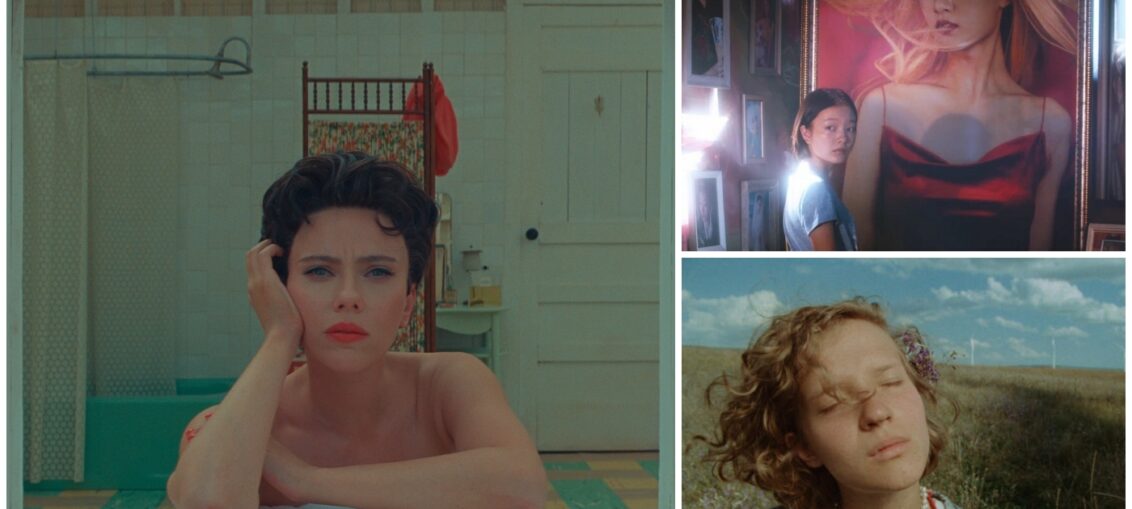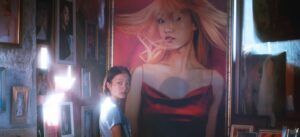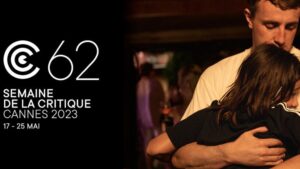
Italy also has its say
(from Cannes Luigi Noera and Marina Pavido – Photos are courtesy of the Cannes Film Festival)
On this eighth day of the 76th Cannes Film Festival, the program turned out to be richer and more varied than ever. Next to, indeed, the presence in the competition of names of the caliber of Marco Bellocchio and Wes Anderson, especially awaited on the Croisette was the director Takeshi Kitano, here out of competition with “Kubi”, his latest. Below, as usual, here is an overview of some of the feature films that premiered at Cannes 76.
COMPETITION
 ASTEROID CITY di Wes ANDERSON
ASTEROID CITY di Wes ANDERSON
Among the most awaited feature films in competition a Cannes 76, there is undoubtedly Asteroid City, the latest effort from acclaimed director Wes Anderson. It would be enough to observe, therefore, even just a single frame to understand that it is a Wes Anderson film. And the director, its part, has once again remained true to its marked aesthetic and style, so symmetrical, cared for down to the smallest detail and with a pastel-colored photograph that almost gives the whole thing the tones of a fairy tale.
In this case, therefore, we are in the small town of Asteroid City, in the middle of the desert, in the fifties, i.e. in the midst of the Cold War. The municipality of the city has organized a small event in which particularly intelligent and gifted children for their age will have to present some of their inventions. da who, therefore, a series of bizarre events will start.
Asteroid City, therefore, spread over two levels (skilfully represented each in black and white – a play – the other in color – the main story). Halfway between surreal fairy tale and science fiction, this latest work by Wes Anderson thinks first of all about cinematic language and metalanguage, moving from one level to another with grace and lightness, without disdaining, obviously, il tipico humor à la Wes Anderson.
Strengthened by a stellar cast that includes names of the caliber of Scarlett Johansson, Tom Hanks, Adrien Brody, Jason Schwartzmann e Steve Carell (just to name a few), Asteroid City if you present, as often happens in the author's works, like an ensemble film, that, in this case, however, it can be excessively frayed at times and that, all in all, can almost be classified as a minor work. Despite the great potential of the story itself.
KIDNAPPED by Marco BELLOCCHIO
In 1858, in the Jewish quarter of Bologna, the Pope's soldiers break into the house of the Mortara family. By order of the cardinal, they've come to get Edgardo, their six-year-old son. The child would have been secretly baptized by his nurse when he was small and the pontifical law is indisputable: must receive a Catholic education. Edgardo's parents, shocked, they will do anything to get their son back. Supported by public opinion in liberal Italy and by the international Jewish community, Mortara's struggle soon took on a political dimension. Luigi Noera saw it for us (REVIEW).
IN SOME PERSPECTIVE
THE BURITI FLOWER by João SALAVIZA, Renée NADER MESSORA
Through the eyes of his son, Patpro will retrace three periods in the history of its indigenous people, in the heart of the Brazilian forest. Tirelessly persecuted, but guided by their ancestral rites, from their love of nature and their struggle to preserve their freedom, the Krahô are constantly inventing new forms of resistance. Luigi Noera saw it for us (REVIEW).
TERRESTRIAL VERSES by Ali ASGARI, Alireza Khatami
A man announces the birth of his son. A mother dresses her daughter for back to school. A student is called by the principal. A young woman disputes a fine. A girl shows up for a job interview. A young man goes to collect his driving licence. An unemployed person answers an ad. A director asks for a filming permit. A woman tries to find her dog. Nine faces of daily life in Tehran. Luigi Noera saw it for us (REVIEW).
OUT OF COMPETITION
CANNES PREMIERE
KUBI di Takeshi KITANO
In the XVI century, Japan was plagued by conflicts between rival provincial governors. Between them, With Lord Oda Nobuna, determined to conquer the country, is at war with several clans when one of his generals, Araki Murashige, he rebels before disappearing. Luigi Noera saw it for us (REVIEW).
FORTNIGHT
 GRACE di Ilya Povolotsky
GRACE di Ilya Povolotsky
The Week from the Critique, and to, has often given us, During the years, some real gems within the contemporary world cinematographic panorama. One of these goodies a Cannes 76, eg, is represented by the feature film Grace, first work by the young Russian director Ilya Povolotsky which proved to be above all a sincere one, deep homage to cinema.
The story staged, therefore, it is that of a father and daughter who travel around the country in their van. Inside this van there is practically their entire life, along with equipment to set up, in the places visited from time to time, a small traveling cinema. The crisis of the sector, however, it won't help their already meager income. Their, on the other hand, they will continue to resist in their business.
Grace, therefore, it immediately stands out for the extraordinary directorial maturity of the young filmmaker, despite the lack of experience behind the camera. Long sequence shots and a strongly contemplative trend are the absolute protagonists within a staging in which silences almost always prevail over words. Sequential shots of huge landscapes that are lost on the horizon, along with intense close-ups of the young protagonist, which, always deeply in love with the seventh art and the small cinema that she runs together with her father, timidly begins to face adulthood, between changes in one's body and first loves. In this sense, therefore, Grace it turned out to be an extraordinarily mature and undoubtedly impactful feature film. A real pearl within the selection of Cannes 76.
 A SONG SUNG BLUE di Zihan Geng
A SONG SUNG BLUE di Zihan Geng
adolescence, and to, it is never an easy age. They are numerous, indeed, the changes that are going on in this period. And a, as it often happens, the relationship with the parents becomes particularly conflictual here, changing one's life out of the blue could prove to be an even traumatic event. Unless you can find something to believe in or something to fight for. He knows something, about that, young Xian (impersonata da Meijun Zhou), protagonist of the feature film A Song Sung Blue, first work by the young Chinese director Zihan Geng premiered at 76° Festival of Cannes inside the fortnight of the Filmmakers.
Xian, therefore, she is fifteen years old and she is a shy and lonely girl. At a time when his mother will have to leave for a health mission in Africa, the girl will temporarily move to her father's house, whom he hasn't seen for years and who works as a photographer. Here the young woman will meet the beautiful and rebellious Mingmei (Ziqi Huang), daughter of her dad's new girlfriend, and will be immediately fascinated by her. A special bond made up of confidences and moments of light-heartedness will immediately arise between the two.
Xian e Mingmei sono, therefore, two characters apparently at the antipodes. and yet, to observe them well, we gradually realize how the two may have more in common than it initially seems. One could even argue that Mingmei is a kind of older version of Xian o, even better, the ideal adult version for Xian, so seemingly casual and carefree in company, How much, in reality, much more melancholic and fragile than he wants people to believe.
The story of the two protagonists is told to us in A Song Sung Blue with elegance and delicacy, for a staging that focuses heavily on intense close-ups and silences and which is further enriched by sumptuous and colorful costumes and songs that skilfully act as a trait d'union between past and present, revealing a much deeper bond than one might believe. Zihan Geng has revealed an extraordinary sensitivity and a good command of the cinematographic medium with this tender and delicate debut of his. And who knows what other nice surprises it will have in store for us in the future!
 CRITICS WEEK – THE PRICES
CRITICS WEEK – THE PRICES
They were assigned, today, the awards for feature films and short films presented at the Semaine de la Critique in Cannes 76. The judging panel was chaired by director Audrey Diwan. Below, here are all the films awarded in this 76th edition of the Cannes Film Festival.
Grand Prix
Tiger Stripes by Amanda Nell Eu
Prix French Touch du Jury
It's raining in the house by Paloma Sermon-Daï
Leitz Cine Discovery Award for Short Film
Bolero by Nans Laborde-Jourdaa
Louis Roederer Foundation Prize for Revelation
Jovan Ginić trans Lost Country di Vladimir Perišić
Gan Foundation Prize for Broadcasting
Pyramide Films French distributor per Inshallah a boy di Amjad Al Rasheed
SACD prize
Iris Kaltenback, author of The Rapture
Canal+ Short Film Prize
Bolero by Nans Laborde-Jourdaa
__________________________________________________________________
marina fears
